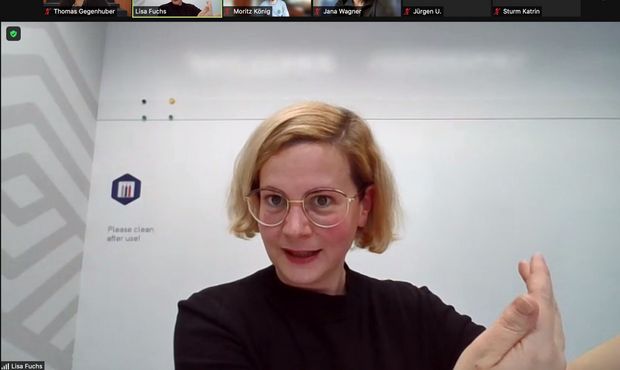In the third round of the Sustainable Transformation Dialogues, we welcomed Lisa Fuchs, Head of Corporate Communications & Diversity at RHI Magnesita, who addressed sustainable corporate practices.

The Austrian-Brazilian company RHI Magnesita is the global leader in the refractory sector and produces refractory products that are used in high-temperature industrial processes. In total, more than 14,000 employees work for the company worldwide. Sustainability is rooted in the company and is reflected in the corporate objectives, business processes, and corporate culture.
In her presentation, Lisa Fuchs first explained the triple bottom line approach, in which the environmental, economic, and social aspects interact interdependently. Based on this, Lisa Fuchs went into detail about various standards for achieving sustainable action. She then discussed the relevance of the UN Sustainable Development Goals (SDG) with the students.
The SDGs were defined in 2015 by all 193 member states of the United Nations. In total, there are 17 different targets, with each SDG consisting of several more specific goals. According to Fuchs, "SDGs are the bouquet of measures from which you can pick and choose which goal a company might contribute to." A project related to the Sustainable Development Goals is the "UN Global Compact". The UN Global Compact is an initiative of the United Nations to encourage companies worldwide to make globalization fairer and more sustainable. Companies that decide to participate commit themselves to the 10 principles of the pact as well as the 17 sustainability targets and receive support in sustainability management in return. As a participant in the UN Global Compact, RHI Magnesita strives to measure the company's sustainability targets and to make them visible to the various stakeholders through various certification processes. In this context, Lisa Fuchs discussed certification processes such as the "B-Impact Assessment" at BCorporations with the students. Fuchs said, "What is relevant is what the companies are doing. You have to be aware that in the end, only reality counts."
In the subsequent discussion, Lisa Fuchs addressed the change in values over time. In recent years, there has been a shift from a shareholder to a more stakeholder-oriented approach. Whereas a few years ago the focus was on "Corporate Social Responsibility (CSR)", it shifted later to the term "Sustainability". As sustainability was or is still strongly influenced by the environmental aspect, "Environmental Social Governance (ESG)", which conceptually also includes social and political issues has gained momentum. Towards the end, a student asked what the individual contribution to more sustainability in the sense of the SDGs can be. Lisa Fuchs emphasized that even small actions can have a big impact because they help to strengthen the culture and awareness of sustainability. "Finally, one should also think about the role in the company. Employees can have a significant impact on the company's actions towards more sustainability."
Prof. Thomas Gegenhuber thanks Lisa Fuchs for the exciting insights and looks forward to seeing her again in the summer semester as a lecturer at the JKU, where she will teach the course "Sustainable Business Practices".
 Go to JKU Homepage
Go to JKU Homepage








